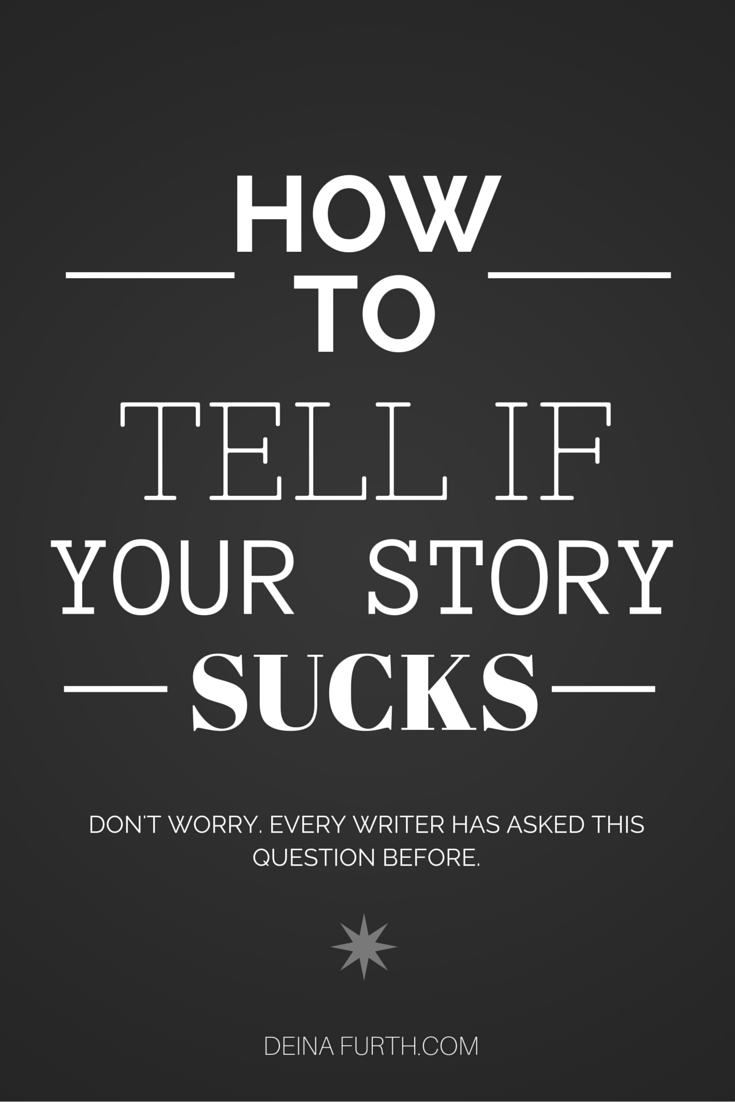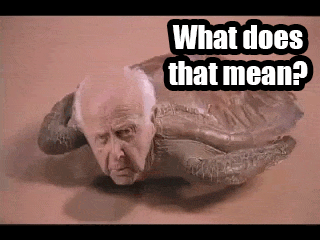
We’ve all wondered. We’ve all been scared. Every writer on the planet (barring complete and utter narcissists) has asked THE question before.
“Does my story suck?”
Eh, maybe it does, maybe it doesn’t. There comes a point where we writers are too attached to our work, and we just can’t see the mistakes that others can. We’ve bled our souls onto paper and we are not in the mood to receive scathing criticism, the salt in the wounds.
And so we maybe do a little bit of this:

LA LA LA I CAN’T HEAR YOU, LA LA LA NO SPOILERS
And when someone is waffling on just telling you like it is, maybe a bit of this:

No, seriously, are you trying to tell me this sucks, or…?
And if someone’s being really mean about the whole damn thing, some of this:

You hurt my fee-fees. Now I’m upset.
So how can I learn to tell if my writing sucks before someone stabs me in the heart with their rusty mouth-daggers of hateful words?
There are a few things you can ask yourself before you hand that story off to anyone else. Of course, nothing is fool-proof. You’re never going to be able to please everyone. And most certainly, some people just want to stab you with their rusty mouth-daggers for the hell of it, and they hope you die a slow, painful death of broken heart tetanus. And those guys are just, ugh. They’re the worst. So let’s move on, shall we?
Here are a few tips that I offer you so that you won’t have to feel so paranoid. Do yourself a favor and be 100% honest when asking yourself these questions. If you’re not completely honest, you could be crippling your own work before the others get to read it and tear it down. But if you really learn to be harsh and critique your own work, you stand a much better chance of not writing a completely sucky story.
Read your story aloud.
This is one of the top tips I give writers who want to self-edit, too. And there’s a damn good reason why: Because when you read things out loud, you’re going to stumble over the awkwardly-worded phrases. You’re going to get hung up on repetitive verbs or useless, decorative words. And you’ll notice annoying dialogue tags better than if you were just skimming through with eyeballs only.
Think of the pros.
Quick, what’s your favorite story in the genre you’re writing? Great. Now think about what makes that tale so delicious. What kinds of stakes did the main character have to face? Which internal and external dilemmas were there to overcome? Which hurdles were the toughest for them? These are all great things that make a story compelling.
Now ask yourself the same questions. Is your character overcoming hurdles? Are the stakes high enough? Does your character learn something and grow as a person? Do they have both internal and external conflicts?
If you notice that you’re coming up short in comparison to your idealized story, think about ways you can make the drama more palpable and the characters richer and more relatable.
Summarize.
Take your story’s plot and water it down into only the most basic elements. Does it sound compelling now that you’re looking at the bare bones of it all? Does it match your original notes or does it deviate from your plans? Keep in mind, deviation is natural and isn’t necessarily a bad thing. But if your story has gone completely off-track, maybe you need to re-evaluate why you’re writing it and what your goal is. Sometimes we lose sight of our original plans, and other times, people give us feedback that makes us want to change everything. Decide for yourself what the goal of the story is going to be and get yourself back on track again if you need to.
Look for contradictions.
If you decide that your story is ultimately a tale of love and loss, but you end up telling a revenge tale, then you’re not really telling a very good story. You need to make sure that your theme stays intact throughout the whole story, and you have to be sure that your characters don’t morph into different people (not to be confused with characters growing or changing for development’s sake–I mean just changing because you got sidetracked or didn’t bother to remember whether the main lady’s eyes were smouldering gray or forest-nymph green)–or worse, become indistinguishable. Look, my examples might be a bit overdone, but you know what I’m talking about: If your story contradicts itself, readers will pick up on it. And readers don’t like that one bit.
Find the strengths and weaknesses of each character.
If you can’t find several of each for the main cast, you’re in trouble. Yes, even for the villain.
There was a time when telling a simple “good vs. evil” story was perfectly fine. And in some cases, you can still get away with it. But people nowadays look for complex, nuanced characters. They want to feel like they can get to know the main character–or even be able to get inside the head of the villain. How can you do this if you cast them in black and white, good and bad? You can’t. So think of strengths and weaknesses for every one of your major characters to really amp up the drama.
Are you using stock characters to prop up the protagonist?
Check out TV tropes for more information. Now, you’re never going to write a completely, 100% trope-free character. Hell, even YOU would probably fit into the TV tropes list somewhere! But you shouldn’t have weak, two-dimensional characters in the book to prop up your main character. Nothing sinks even the most original of stories faster than flat, boring, awful, horrible, NO BUENO characters.
So make damn well sure your characters are interesting. K. Thanks 🙂
Are you coming at this from a narrow point of view?
Check out my videos for the need of diversity in books for more information. Suffice it to say, if you’re a white, cis, straight dude writing a book about a white, cis, straight dude, you’re writing what you know. That’s not inherently bad. But the characters in your world should not all be the same. Make sure your character has male and female friends, that not everyone shares the same skin color, and that you consider including LGBTQ characters. You don’t have to include everything in every story. But if your cast is looking like a “picture frame family” and not like an awesome, eclectic collection of amazing beings it should be, then you’re going to have to start looking at changing some things around.

Are you throwing events in just to seem “edgy” or because you had nothing else to go on?
Look. I’m all for plot twists. Murderous rampages. Surprise betrayals. That sort of thing.
But this isn’t what I’m talking about. I’m talking about unnecessary events that just seem thrown in because you had nowhere else to bring the reader. You’d written yourself into a corner, and, panicking, you wrote yourself out by miraculously killing off someone that you didn’t know what to do with.
Readers can see through that crap. If you’re doing it, don’t think they won’t notice. They will. Ohhhh, they will.
And if you’re throwing in added drama to be “edgy”, you can cut that out right now. There are certain crowds that like played up drama. If you know your genre (YA, for example) and it calls for this type of drama, then that’s one thing. But there are still far too many people who throw in things to seem perverted, gross, religiously offensive, or whatever. I know, I know: Free speech and all that. And that’s fine. But to me, reading stories where the author is clearly trying TOO hard to be edgy or risque comes off like a dubbed Godzilla movie: The content is all there, but it’s overdone and humorous when the prose is just laughably ill-timed.
Can you think of any other things I missed? Let me know in the comments! Did you like what you read here? Consider subscribing to my newsletter–I very rarely send out updates unless they’re super-important.
I think another way to tell if your story sucks is whether you make it easy for your readers to know what the protagonist wants and struggles to achieve throughout the story. This idea plays a little into your “Contradictions” point. If your main character is vacillating too much or flowing along with other forces without a transparent “mission”, then perhaps you have not defined him/her well enough. One character quality that makes a reader support a protagonist is the ability know what the protagonist wants to achieve. Minus that, readers may not really care if the protagonist falls into a deep, dark pit of hungry alligators and gets gobbled alive. Just sayin’.
Absolutely! Great point.